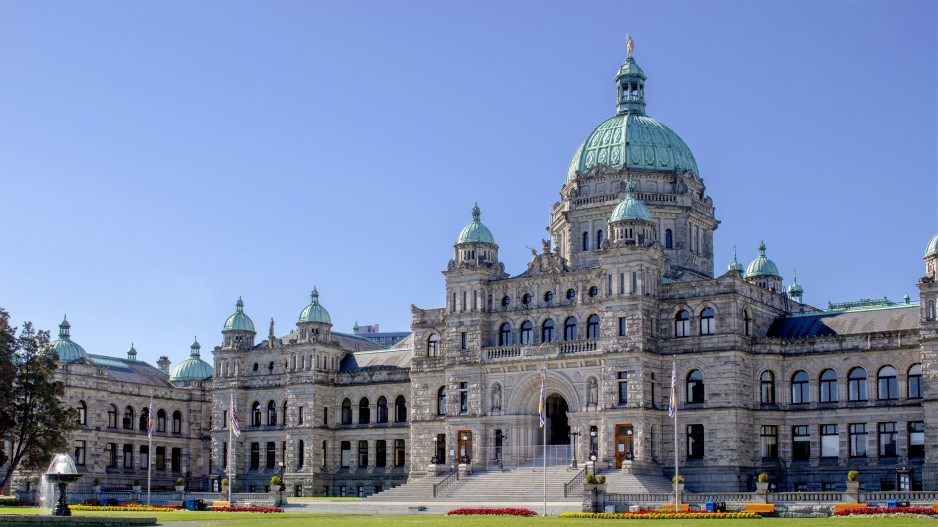One of the great lasting legacies of the BC NDP government will be its much-needed reforms to political finances. Banning union and corporate donations. Setting personal donation limits. Forcing disclosure on third-party advertisers in the 60-day pre-campaign period.
Those are just a few of the measures that, long after the NDP is gone one day, will help ensure transparency, accountability and fairness in an increasingly fragile election process.
For whatever other criticisms you might levy upon New Democrats, you have to give the early John Horgan administration credit for making the move — even if it was accompanied by a flip-flop on a promise not to backfill the donor crackdown with public funds using a per-vote subsidy.
Overwhelmingly, the changes to political donations have been a positive pushback to the influence of big money in politics and a welcome beam of sunlight into the shadowy world of partisan finances.
Which is perhaps why it’s so jarring right now when you see a secretive third-party group, with no disclosure of who they are or where they get their money from, launch a blitz of hyper-negative political advertising.
An organization calling itself “Project for a Strong BC” has been buying up all sorts of airtime on TV stations with attack ads against BC Conservative Leader John Rustad and BC United Leader Kevin Falcon.
“This October, B.C. families face a returning threat, except now there’s two of them,” says a deep-voiced announcer.
“Kevin Falcon and John Rustad. In Christy Clark’s Liberal government they cut health care, raised fees and tolls, and made housing unaffordable. Now they want to do it all again.”
The faux movie trailer style ad ends with the title: “BC Liberals 2 - Like Christy Clark but worse.”
These are expensive ads, running in prime time and during hockey games. But they aren’t great, by any stretch of the imagination. They lack sophistication. They aren’t funny. The tone reeks of blind, entrenched, hyper-partisanship, not an attempt to reach ordinary voters.
“Project for a Strong BC” doesn’t identify itself, other than vague “group of concerned and engaged British Columbians” boilerplate on its website. Technically, it doesn’t have to.
It is spending early enough before the Oct. 19 provincial election that it can get away with not identifying its donors, sources of income, how much money is being spent, how it is being spent, or who it is affiliated with.
Were the organization to run these ads in the actual 28-day election campaign period, after the writ is dropped Sept. 21, it would be subject to a $150,000 spending limit, be forced to register with Elections BC as a third-party advertiser, not collude with any candidates or parties, report all its financial information and more.
Were it to run the same ads in the 60-day pre-campaign period before that, it would face similar reporting requirements (but no spending limit).
Together, that’s an 88-day bubble of transparency and accountability for the public to know who is responsible for the ads they are reading, hearing and seeing.
But outside of that window, there’s almost nothing.
It’s odd, when you think about it.
B.C.’s political parties are already in campaign mode, appointing candidates, holding party events and in some cases even running their own ads.
But third-party advertisers can basically do whatever they want right now, in secret, until July 23 when the pre-campaign period kicks in.
It doesn’t make a lot of sense. And it runs contrary to the spirit of what the NDP was trying to achieve when it brought in the changes.
“The days of limitless donations, a lack of transparency and foreign and corporate influence over our elections are history,” then attorney general David Eby said Sept. 18, 2017.
When asked about the “Project for a Strong BC” ads last week he demurred.
“Third-party advertisers have to follow the rules that are established in the province,” said Eby.
“One of the key pieces that I'm certainly proud of as AG was getting the big money out of politics and making sure that politicians are directly accountable to British Columbians as opposed to big money interests in the province. Regardless of which third parties are advertising, they all have to adhere to those Elections BC standards going forward.”
Except when they don’t. Which is right now.
New Democrats have a lot to be proud of when it comes to electoral reform. They’ve shown political courage in cracking down on shady practices in the past, even when it has angered their allies, like unions.
So maybe they should take it one step further: If you want to be a third-party advertiser saturating British Columbia’s airwaves and websites with election ads any time during an entire election year, you should face at least some requirements for transparency outside of that 88-day window.
It doesn’t have to be a pre-pre-campaign spending cap, which in the past courts have rejected and critics have said was an attempt to stifle free speech. But it should be basic details to prospective voters about who you are, where you get your money and how you are spending it.
Otherwise, big money and political influence continue to hide in the shadows.
Rob Shaw has spent more than 16 years covering B.C. politics, now reporting for CHEK News and writing for Glacier Media. He is the co-author of the national bestselling book A Matter of Confidence, host of the weekly podcast Political Capital, and a regular guest on CBC Radio.




